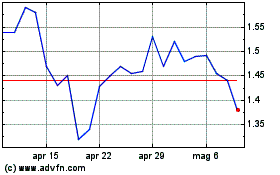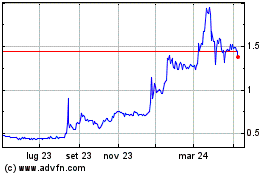Freddie Mac Starts Pilot Program With Looser Standards
20 Settembre 2016 - 7:40AM
Dow Jones News
Mortgage-finance giant Freddie Mac and two nonbank lenders are
loosening income and documentation requirements for mortgage
applicants in a new pilot program.
The changes announced Monday are designed to help boost mortgage
originations among first-time buyers, applicants with
low-to-moderate incomes and those who live in underserved
areas.
The moves come nearly a decade after the start of the mortgage
meltdown, as many consumers remain shut out of the housing market
largely because they can't meet the underwriting criteria that most
lenders require. Under the Freddie program, applicants will be able
use the income of people who will live with them but aren't going
to be on the mortgage to qualify.
In addition, income from second jobs that borrowers have held
for a relatively short period will be factored in. The pilot also
doesn't require bank statements that would show a paper trail of
how some borrowers save for their down payments.
Many of the pilot's features are similar to what Fannie Mae
currently allows on some mortgages it purchases but are new for
Freddie Mac, which is among the largest purchasers of mortgages in
the country. Freddie Mac says it purchases one in every four
mortgages originated by lenders in the U.S.
The changes, which went into effect on Monday, will apply to
people who sign up for a mortgage with Las Vegas-based Alterra Home
Loans or Tustin, Calif.,-based New American Funding. The companies'
specialties include lending to low-income and Hispanic borrowers.
The lenders will sell the mortgages they originate to Freddie
Mac.
The partnership has been in the works since late last year and
will be in effect for at least 12 months. Freddie Mac will
determine whether to expand it beyond pilot phase if performance
meets expectations. It declined to discuss any numbers it has as
goals for loan volume or the delinquency level it would like to
stay below.
The pilot isn't lowering down payment or credit score
requirements. Rather it is loosening income criteria, including for
applicants who have two jobs. Until now, Freddie Mac has required
that borrowers who show their income from a second job when
applying for a mortgage demonstrate that they have held that job
for at least 24 months, a period that in the pilot is reduced to 12
months. Separately, self-employed borrowers will have more options
to prove their business exists to the lenders.
In addition, borrowers who will be living with family or other
individuals for at least 12 months after they purchase the home
will be able to use those non-borrowers' income to get approved for
the mortgage. The income will be factored in to help improve the
borrowers' debt to income ratio, a key figure that compares
borrowers' monthly debt obligations to their gross monthly
income.
Paperwork requirements will also loosen up for some borrowers
who don't have bank statements to show how they have saved for
their down payment.
Write to AnnaMaria Andriotis at annamaria.andriotis@wsj.com
(END) Dow Jones Newswires
September 20, 2016 01:25 ET (05:25 GMT)
Copyright (c) 2016 Dow Jones & Company, Inc.
Grafico Azioni Fannie Mae (QB) (USOTC:FNMA)
Storico
Da Mar 2024 a Apr 2024

Grafico Azioni Fannie Mae (QB) (USOTC:FNMA)
Storico
Da Apr 2023 a Apr 2024
